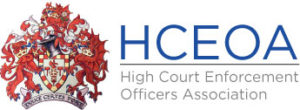VAT on High Court Enforcement Fees – HCEOA Press Release
Dear Client,
Following our recent statement on VAT on High Court Enforcement Fees, we would like you to be aware of the following press release issued by the High Court Enforcement Officers Association (HCEOA). This underlines our position, that High Court Enforcement Officers (HCEOs) have not been charging Debtors VAT on High Court Enforcement Fees incorrectly. We also fully support the Association’s desire to change High Court Enforcement Fees to being zero-rated.
I hope that this information is helpful and thank you for your attention.
Your sincerely,
Alan Smith & Malcolm Davies
Authorised High Court Enforcement Officers
Directors – Court Enforcement Services Ltd
Press Release on behalf of the High Court Enforcement Officers Association
VAT on High Court Enforcement Fees
A certain amount of confusion has arisen from the reply to a Written Question in the House of Lords by The Earl of Courtown on 29th October 2019 about the application of VAT on High Court Enforcement Fees:
The Association agrees with the Government’s stated position that VAT is charged to Claimants rather than Debtors as the service provided by High Court Enforcement Officers (HCEOs) when enforcing Writs of Control, which are based on Court Judgments, is to the Claimant and not to the Debtor.
However, in some circumstances, the Debtor currently pays the VAT on High Court Enforcement Fees because a Claimant is entitled to recover the enforcement fees on top of the judgment debt, costs and interest from the Debtor and accordingly the VAT payable on those fees. This was acknowledged on the Government website providing advice on what to do when a bailiff calls, under “What Bailiffs can charge”, although the reference to HCEOs charging VAT on enforcement fees has been removed in the last 2 days:
https://www.gov.uk/your-rights-bailiffs
This is known as “irrecoverable VAT” as the Debtor cannot be issued with a Vat Invoice, as the service being provided is to the Claimant and the Claimant cannot be issued with a VAT Invoice as he has not paid the fees. The VAT in these circumstances is paid to HMRC by the HCEO business in the usual way. This approach was agreed by the Under Sheriffs Association with the VAT Policy Directorate in 2000.
Debtors are not, therefore, charged VAT on High Court Enforcement Fees, but in some circumstances do pay the VAT charged to the Claimant. HCEOs do not benefit from VAT being charged in any way and, like all registered businesses, undertake the collection of VAT on behalf of HMRC as an accepted burden of running a commercial business.
It is not true to say that HCEOs have been charging Debtors VAT on High Court Enforcement Fees incorrectly, as seems to be the interpretation of StepChange & Citizens Advice of the The Earl of Courtown’s Written Answer.
The Ministry of Justice, which regulates HCEOs, is currently reviewing the position of irrecoverable VAT with HMRC and their own legal team and guidance on the approach to be taken in future is expected shortly.
The Association favours High Court Enforcement Fees being zero-rated, which was the initial position between 1974 & 1976 and would result in no Claimant’s VAT being payable by Debtors in the future.
7th November 2019

High Court Enforcement Officers are responsible for the enforcement of the Writs of Execution issued out of the High Court, the most popular of which being the “Writ of Control” formerly known as “Writ of Fieri Facias” or “Writ of Fi Fa”. This is a writ issued for the recovery of money owed and provides for the seizure and sale of the judgment debtor’s goods.

